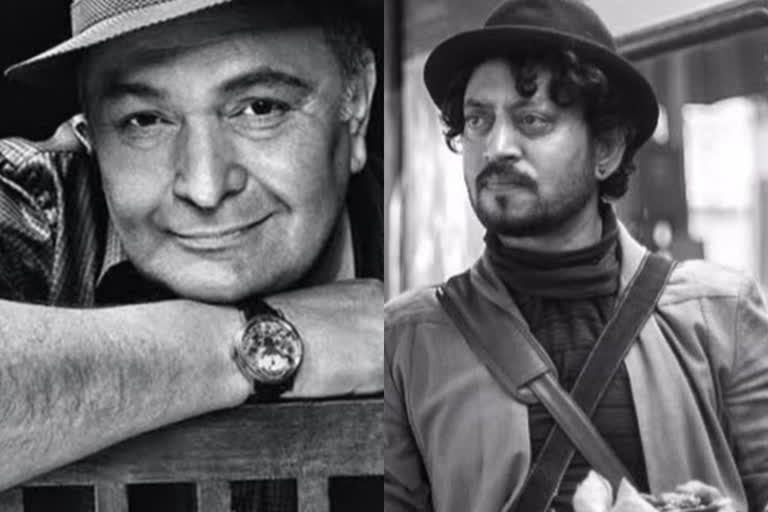New Delhi: In D-Day (2013), Nikkhil Advani's intense hyper-nationalistic thriller about a "New India" that hunts terrorists in their lair, there is a moment when Rishi Kapoor's Goldman (modelled on Dawood Ibrahim) holds Irrfan's RAW agent Wali by the hand and asks him to think of how the world will brand them forever.
As they passed on within a day of each other, the world remembers them together--two consummate actors at the top of their game, who were only getting better.
Yet they couldn't have seemed more apart. Rishi Kapoor, 67, third-generation actor of Mumbai cinema's first family, never had to struggle except with his own demons of alcoholism and insecurity. Irrfan, 53, another sort of sahibzade (prince) from a minor royal family of Tonk, Rajasthan, coming to Mumbai cinema through National School of Drama and yet taking many years to find his feet. One a spontaneous, seat-of-your-pants actor, the other classically-trained and deeply philosophical. One who had acting in his genes, having faced the camera for the first time as a three-year-old in his father's Shree 420 in the song Pyaar hua ikraar. The other whose family ran a tyre business and who first came to Mumbai as an airconditioner repairman.
Yet there was much in common with these two, a love of the craft and the ability to cut through the nonsense. Neither had time for unnecessary frills. Rishi Kapoor expressed it with greater force, Irrfan, the gentler of the two, was calmer. Both have left a legacy of movies that audiences will savour.
If Irrfan was always the man, serious, contemplative, a tad too old for the gang that Mira Nair had done the Salaam Bombay (1988) workshop with. Co-writer Sooni Taraporevala recalls when their director of photography came down to Mumbai, she felt Irrfan was too old to play a boy. Sadly Nair had to let him go, and he had to eventually settle for a minor role of a roadside scribe.
Rishi Kapoor was the eternal boy, from the young Raj Kapoor in love with his school teacher in Mera Naam Joker (1970) to the sophisticated suit-clad, poised young man of the ultimate teen romance Bobby (1973). For many children of the 1970s, Bobby was the movie that taught them about friendship and sex, knotted tops and leather jackets. It also taught them to love without caring about class and religion. Rishi started as he went along, starring in a series of seemingly light-hearted romances which morphed into another kind of cinema of realism as the actor grew older. By the 2010s, he was acting in movies where he could play an ordinary middle-class teacher in Do Dooni Char (2011) with as much ease as he played a Muslim patriarch accused of terror in Mulk (2017).
Read: Rare! A glimpse of Irrfan's NSD days
And though he could be a typical drunk Uncle on Twitter, saying what he wanted with no filter, or as his autobiography said Khullam Khulla, he was one of the few in the Mumbai film industry who spoke his mind, from being a beef-eating Hindu to wanting peace with Pakistan. Irrfan too spoke truth to power, not flinching even when Muslim clerics objected to his remarks about the slaughtering of bakras not being the true definition of qurbani. With his increasing exposure to international cinema, he played a series of grown-up men, from Ashoke Ganguly of The Namesake (2006), the recalcitrant grieving maths teacher of In Treatment (2010), Pi Patel in Life of Pi (2012), or Saajan Fernandes in The Lunchbox (2013). Even when he played stereotypical villains in noisy Hollywood blockbusters like Jurassic World (2015) and Inferno (2016), he brought a certain stillness to the parts which uplifted the movies.
Both showed tremendous dignity in their battle with cancer, remaining cheerful and witty to the last. If Irrfan joked about negotiating with "unwanted guests" in his system, Rishi Kapoor quickly got to work on Sharmaji Namkeen, and being his old self on Twitter, tweeting old pictures, unedited opinions and festival greetings.
In D-Day, you can see both actors bring the best of their craft to the movie--Rishi Kapoor, brash, bullying, and bombastic as his character demands, and Irrfan subtle, enigmatic, mysterious as his RAW agent requires. Huma Qureshi who worked with both of them in D-Day described both of them as "authentic, true to who they were, always unapologetic, unflinching and supremely talented".
Advani, the director, who had the great fortune of watching these twin talents working together, says he feels "empty' at their passing away.
That's exactly how the rest of the world feels too.
"Hang in there, world," said Rishi Kapoor, retweeting someone else's post during the lockdown. "Wait for me," said Irrfan. Great advice for life from two legends.



